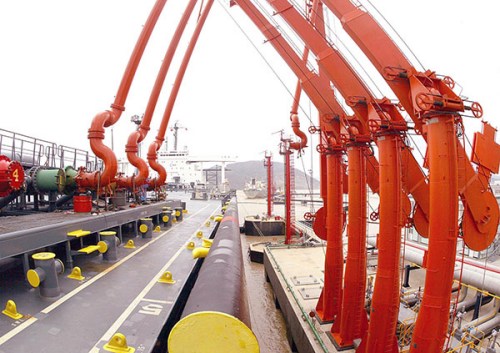
An oil tanker unloads crude at Ningbo port in Ningbo, Zhejiang province. (Photo provided to China Daily)
Domestic demand helps fuel changes in the way that transactions are done in the world market
Chinese oil companies' rapid switch of oil purchases from over the counter to exchange-based transactions has helped the eight-year-old Dubai Mercantile Exchange become a highly influential regional crude oil marketplace.
Within eight years, Chinese oil imports have grown to account for 70 percent of the physical delivery of oil traded on the Dubai-based DME, compared with about 40 percent three years ago.
Such large purchases have made the DME's Oman crude contracts a regional benchmark, on par with Brent crude of London and West Texas Intermediate in New York.
Oman crude has also become the largest physically delivered oil-futures contract in the world, largely driven by China's high demand for oil. In comparison the Brent and the WTI are for crude oil more commonly traded as risk hedges.
"We are seeing an increase in activities from China, and we are happy with the growing cooperation with Chinese traders, Bank of China and the Shanghai Futures Exchange," said Owain Johnson, managing director of the DME in the United Arab Emirates.
Johnson said the exchange is attracting a growing number of Chinese traders, especially after it established a Chinese-language website and a regional office in Singapore to more efficiently liaise with Chinese customers.
In November, Bank of China signed a memorandum of understanding with the DME to cover the financing of Chinese companies' purchase of oil from the exchange.
This agreement led to an announcement in July that Bank of China had instituted a policy of providing letters of credit to Chinese firms buying from the exchange, which demonstrates its endorsement for the exchange's credibility. A letter of credit is an import financial instrument.
"Previously, much of the oil trade on the DME was financed by Western banks, but for the first time Bank of China is stepping into this space to finance trade deals," Johnson said.
"It is often more economic for Chinese oil buyers to use a bank they already have a corporate relationship with, and working with Bank of China could also provide them with lower cost of financing and more logistic convenience."
DME has established a close relationship with Shanghai Futures Exchange and will play an important role in helping the Chinese exchange establish its own crude oil contract by sharing its expertise and introducing its customers to the Shanghai Futures Exchange.
In addition, the two exchanges will share marketing platforms and maintain trading transparency for their respective customer bases, Johnson said.
"China has become our biggest customer so we have a big influence on the oil price in China, and likewise Chinese buyers have a big influence on our crude oil contract price, so we have been exploring how to make trades more efficient," he said.
The Shanghai Futures Exchange has said that the new crude oil contract will be priced in the yuan and will be structured by combining the prices of several key crude oil grades that constitute China's oil imports, one of which will be Oman crude.


















































